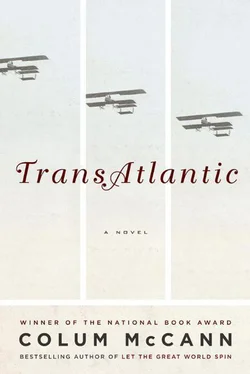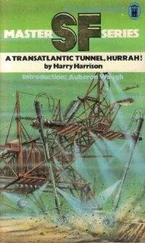She appears at the end of the corridor, moving sharply and quickly. Her dressing gown exposes a triangle of white skin at her neck. He feels an acute and sudden pang of desire to see Kathleen and he is glad for the desire, the errancy of the moment, this odd curving staircase, this far-flung hotel, the too-much brandy. He misses his fiancée, pure and simple. He would like to be home. To nudge up against her slim body, watch the fall of hair along her clavicle.
He holds the banisters a little too tight as Lottie approaches. A piece of paper in her left hand. He reaches out. A letter. That is all. A letter. He scans it. Addressed to a family in Cork. To Brown Street of all places.
— My mother wrote it.
— Is that so?
— Can you put it in the mail bag?
— No imposition at all, he says, turning on the stairs once more, slipping the envelope inside his tunic pocket.
IN THE MORNING they watch as Lottie emerges from the hotel kitchen, her red hair askew, her dressing gown fixed to the neck, tightened high. She carries a tray of sandwiches wrapped in waxed butcher paper.
— Ham sandwiches, she says triumphantly, placing them down in front of Brown. I made them especially for you.
— Thank you, young lady.
She crosses the restaurant floor, waving over her shoulder as she goes.
— That’s the reporter’s daughter?
— Indeed.
— They’re a little cuckoo, eh? says Alcock, pulling on his flight jacket, looking out the window at the fog.
A STRONG WIND arrives from the west in uneven gusts. They are twelve hours late already, but now is the time — the fog has lifted and the long-range weather reports are good. No clouds. The sky above seems painted in. The initial wind velocity is strong, but will probably calm to about twenty knots. There will, later, be a good moon. They climb aboard to scattered cheers, secure their safety belts, check the instruments yet again. A quick salute from the starter. Contact! Alcock opens the throttle and brings both engines to full power. He signals for the wooden chocks to be pulled clear from the wheels. The mechanic leans down, ducks under the wings, armpits the chocks, steps back, throws them away. He raises both arms in the air. A cough of smoke from the engines. The propellers whirl. The Vimy is pointed into the gale. A slight angle to the wind. Uphill. Go now, go. The waft of warming oil. Speed and lift. The incredible roar. The trees loom in the distance. A drainage ditch challenges on the far side. They say nothing. No Great Scott . No Chin up, old sport . They inch forward, lumbering into the wind. Go, go. The weight of the plane rolls underneath them. Worrisome, that. Slower now than ever. Up the incline. She’s heavy today. So much petrol to carry. One hundred yards, one hundred and twenty, one hundred and seventy. They are moving too slowly. As if through aspic. The tightness of the cockpit. Sweat accumulating behind their knees. The motors strike hard. The wingtips flex. The grass beneath them bends and tears. Bumping along on the ground. Two hundred and fifty. The plane rises a little and then sighs again, jarring the soil. Good God, Jackie, lift her. The line of dark pine trees stands at the end of the airfield, looming closer, closer, closer still. How many men have died this way? Pull her back, Jackie boy. Skid her sideways. Abort. Now. Three hundred yards. Good Jesus above. A gust of wind lifts the left wing and they tilt slightly right. And then they feel it. A cold swell of air in their stomachs. We are rising, Teddy, we are rising, look! A slow grade of upwards, an ever so faint lift of the soul, and the plane is a few feet in the air, nosing up, the wind whistling through the struts. How tall are those trees? How many men died? How many of us fell? Brown converts the pines to possible noise in his mind. The slap of bark. The tangle of stems. The ack-ack of twigs. The smashup. Hang on, hang on. The throat still tight with terror. They rise a little in their seats. As if that might unloosen the weight of the plane beneath them. Higher now, go. The sky beyond the trees is an oceanic thing. Lift it, Jackie, lift it for godsake, lift her. Here, the trees. Here they come. Their scarves take first flight and then they hear the applause of branches below.
— THAT WAS A little ticklish! roars Alcock across the noise.
THEY HEAD STRAIGHT into the wind. The nose goes up. The plane slows. An agonizing climb over treetops and low roofs. Careful now not to stall. Keep her rising. Higher up, they begin a slight bank. Take her easy, old chum. Bring her around. A stately turn, all beauty, all balance, its own sort of confidence. They hold the altitude. Banking tighter now. Until the wind is behind them and the nose dips and they are truly leaving.
They wave down to the starter, the mechanics, the meteorological officers, the other few stragglers below. No Emily Ehrlich from the Evening Telegram , no Lottie: mother and daughter have already gone home, early, for the day. They have missed takeoff. Pity that, thinks Brown. He taps the inside of his jacket where the letter still sits.
Alcock wipes the sweat off his brow, then waves to the shadow of themselves on the last of the ground and steers the plane at half-throttle out to sea. A line of golden strand. Boats bobbing in St. John’s Harbour. Toys in a boy’s bath.
Alcock picks up the rudimentary telephone, half-shouts into it: Hey, old man.
— Yes?
— Sorry about this.
— Sorry, what?
— Never told you.
— Never told me what?
Alcock grins and glances down at the water. They are eight minutes out, at one thousand feet, with a wind strength behind of thirty-five knots. They lurch over Conception Bay. The water, a moving mat of gray. Patches of sunlight and glare.
— Never learned to swim, me.
Brown is momentarily taken aback — the thought of ditching at sea, of flailing at the water, floating for a moment on a wooden strut, or clinging to the rolling tanks. But surely Alcock swam to safety after he was shot down over Suvla Bay? All those years ago. No, not years. Just months. It is odd to Brown, very odd, that not so long ago a bullet pierced his thigh and now, today, he is carrying that fragment over the Atlantic towards a marriage, a second chance. Odd that he should be here at all, this height, this endless gray, the Rolls-Royce engines roaring in his ears, holding him aloft. Alcock can’t swim? Surely that’s not true. Perhaps, thinks Brown, I should tell him the truth. Never too late.
He leans into the mouthpiece of the phone, decides against it.
THEY RISE EVENLY. Side by side in the open cockpit. The air rushing frigid around their ears. Brown taps out a message on the transmitter key to the shore: All well and started .
The telephone is a series of wires wrapped around their necks to pick up speech vibration. To listen, they have earpieces tucked beneath their soft helmets.
Twenty minutes into the flight, Alcock reaches under his hat and rips the cumbersome earpieces out, throws them down into the blueness. Too bloody sore, he mimics.
Brown gives a simple thumbs-up. A shame that. They will have no other means of communication now — just scribbled notes and gestures, but they have long ago mapped their minds onto each other’s movements: every twitch a way of speaking, the absence of voice a presence of body.
Their helmets, gloves, jackets, and knee boots are lined with fur. Underneath, they wear Burberry overalls. At any height, even behind the sloping windscreen, it is going to be freezing.
In preparation, Alcock has spent three evenings in a walk-in fridge in St. John’s. One night he lay down on a pile of wrapped meat and failed to sleep. A few days later Emily Ehrlich wrote in the Evening Telegram that he still smelled like a freshly cut side of beef.
Читать дальше












